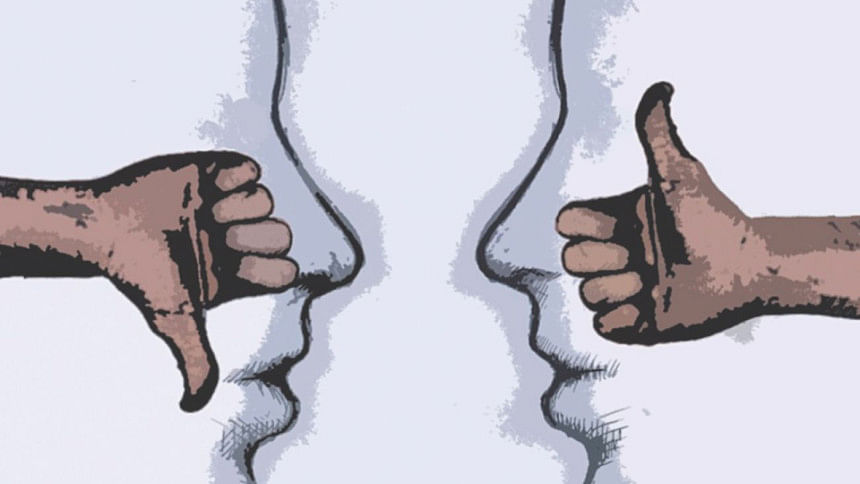The dangers of being judgemental

There is a tendency for people from all walks of life, be it in the West or in Bangladesh, to opt for the easy answers – however erroneous those answers may be. It's a common human trait and we all do it –we jump to the conclusion that just because of one bad apple, the whole bunch is considered spoilt and rotten.
It is fundamentally the difference between correlation and causation. What do I mean by this? For those of us who have never taken a class in statistics, this might seem a tricky concept to grasp. Basically, it means that just because two things happen together does not mean that they are in anyway related to each other. That is correlation. My favourite example is that of a man known as Bobby Henderson. Mr. Henderson argues that the recent effects of global warming can be attributed to the global decline in pirate populations throughout the world. He further goes on to say that Somalia, which has the largest concentration of pirates throughout the world, is the country with the lowest carbon emissions per person.
While his claim is absurd, it is absurd to prove a point – that some things do not have anything to do with each other.
This brings me to my point in this article. Recently, on most media outlets, there has been a vilification of my alma mater. Statements from such esteemed people like the Home Minister and others have portrayed my university as a hotbed for terrorism and extremism. The Pro-VC of the university has been arrested, and in the due course of time, it will be established whether he indeed was complicit in the attacks or whether he was an unknowing abettor. Nibras Islam, a student of North South for three semesters, was also involved in the attack. Abir Rahman, the perpetrator of the Sholakia attack was purportedly a student of North South as well. As were the killers of the secular blogger Ahmed Rajib Haider in 2013.
Yet, if we dig a bit deeper and not fall to the rhetoric of because-X-then-Y, we would find more clues as to why these students, all comparable to myself, would choose the path of extremism.
In Bangladesh, there is something which we do not talk about. It is not a subject easily communicated with our friends, family or teachers. It is a subject treated with denial in this country. It is alienation. It is depression. In Bangladesh, it is almost impossible to communicate with your parents that you are having a tough time. In our dog-eat-dog society, the value that society places on us is determined by only a few things – how good your grades are and how much money you are making at your job. Tell your friends that you are depressed and they will most likely respond with "Arey dost, thik hoe jabe. Tension korish nah" (Oh, don't worry dude, it's going to be alright!), which does almost nothing. It matters not if you are enjoying the work you are doing, if you are having difficulty in your studies or whether you are even enjoying what you are studying at all. There is always the immense pressure from all around us to do well in them. Whatever the cost to our sanity and health.
And if we don't, we are considered failures. We are the dregs of society and burdened by this guilt, we are unable to communicate this sense of failure to our loved ones. We become isolated. In doing so, we become easy pickings to those willing to turn our minds over to darker possibilities.
The media likes to jump at easy conclusions and run their headlines with them, and to most people, the headline is the story. Yet, the complexities of real life cannot be summed up in six words or less. They say that many students of North South University are potential terrorists. They say that all Madrassa students are likely to be extremists. They say that because Nibras was jilted in 2014, he became a terrorist.
Yet, none of those are completely true – they are not the sole factors. Do all people who suffer heartbreak turn to extremism? No – billions and billions of people throughout human history can support that. What about all private university students? Once again – no. Thousands of students from North South University, from BRAC University and other private universities in Bangladesh are working and studying throughout the world, toiling namelessly to make a positive impact in it.
Their contributions should not be besmirched. After all, by making these statements, how are we any different from demagogues like Donald Trump. We are making the same leaps in logic as the man who believes that all Mexicans are rapists and that all Muslims are terrorists.
If we as a society continue to keep doing this, to alienate members of our own with our words and our actions, as we have alienated people who have studied in madrasas for years past, we will pay the price. Whether it will be through more suicides or, Heaven forbid, more attacks like Holey, we will all pay the price.
All of this should be considered as a wake-up call to all strata of Bangladesh. They are among us and it is only through greater communication and greater willingness to find the difficult answers can we, as a society, grow stronger.
The writer is an engineer.

 For all latest news, follow The Daily Star's Google News channel.
For all latest news, follow The Daily Star's Google News channel. 



Comments